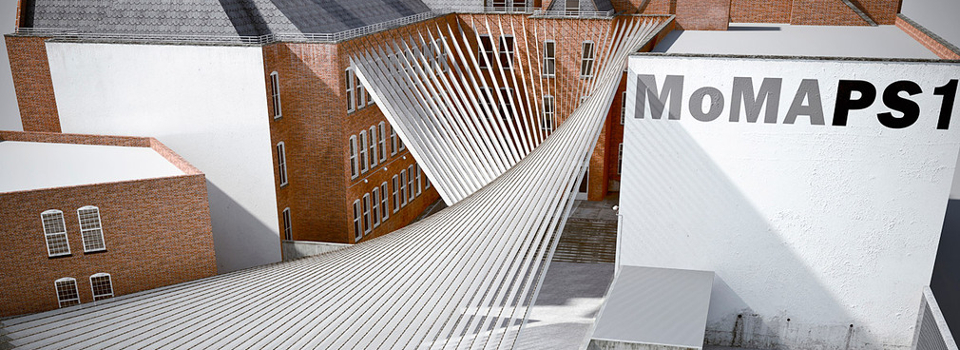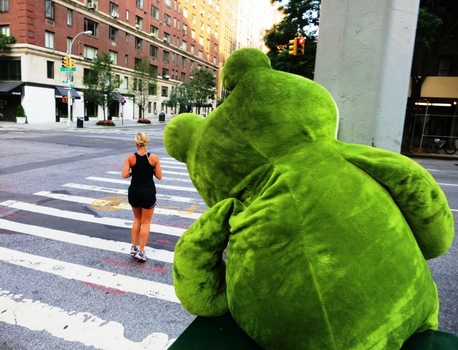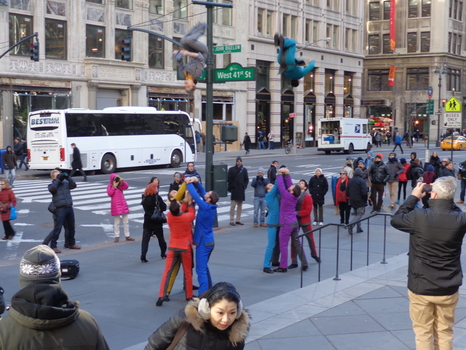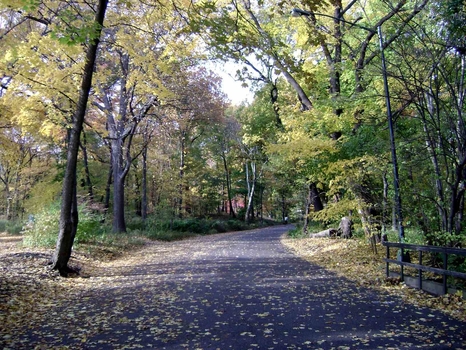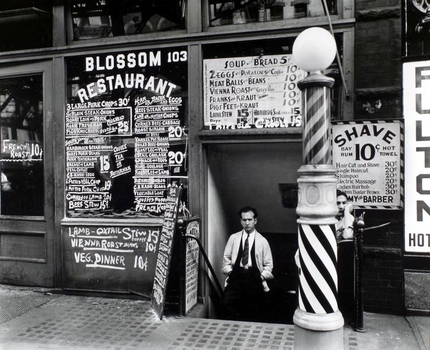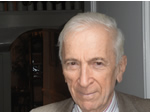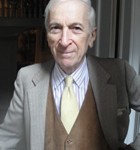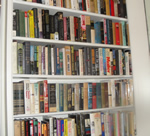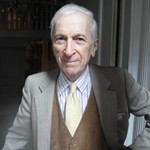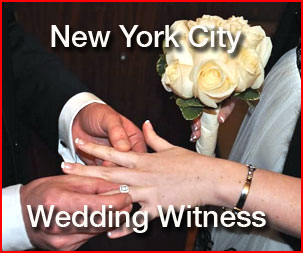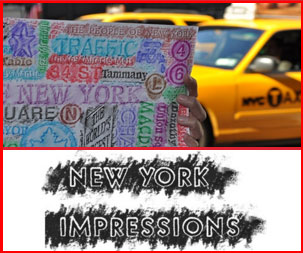I met Gay Talese as I was giving a Phototrek
Tour. I often use his lovely home as a back-drop for pictures. One day, an
attractive woman came out of nowhere and asked why I was taking a picture in front
of this home. I replied, “ I’m giving a tour” and she in turn
said, “Oh, I thought you knew who lives there”. I asked, “So
who lives there?” She replied, “Gay Talese, the author”. The
following day I was giving another tour to a family from Ohio, and I was explaining
to them as we approached Gay Taleses’s home the story from the previous
day. They had no idea who I was talking about. While sharing the importance of
Mr. Talese’s work as an American author and journalist, low and behold,
Mr. Talese appeared. I recognized him and introduced myself and my tour group.
I asked if we could have a picture of him in front of his home, and he graciously
obliged. I gave him my business card and asked if I could interview him some time.
He said out loud, “Kennedy Moore, Ask a New Yorker”. He then wrote
his name and number on the card and handed it back and said “call me, we’ll
set something up”. That was on a Friday. I called him on Monday and he said
to come over that afternoon.
The following is one article I wish I had read prior to the interview. I admit
unfortunately my knowledge of Gay Talese was rather sketchy. “Gay Talese
has been sitting underneath a painting of a naked woman with a rainbow coming
out of her vagina”.
http://nymag.com/arts/books/profiles/56289/
Gay Talese is the bestselling author of eleven books. He was a reporter for the
New York Times from 1956 to 1965, and since then he has written for the Times,
Esquire, The New Yorker, Harper’s Magazine, and other national publications.
Gay Talese was born in Ocean City, New Jersey, and currently lives in New York
City. His groundbreaking article “Frank Sinatra Has a Cold” was named
the “best story Esquire ever published,” and he was credited by Tom
Wolfe with the creation of an inventive form of nonfiction writing called “The
New Journalism.”
His most recent book, A Writer’s Life, was published by Knopf in 2006 and reissued
in trade paperback by The Random House Publishing Group in July 2007. A collection
of his sports writing, The Silent Season of a Hero, was published by Walker &
Company in September 2010.
Gay: This is the first time anybody brought me flowers for an interview, especially
some handsome guy like you.
Ask a New Yorker: Yes, dapper Kennedy, that’s me. You’re looking
really smart yourself.
Gay: Would you like a glass of water, wine or whiskey?
Ask a New Yorker: Water, wine or whiskey. No women? Water would be great, thank
you. What a lovely home! How long have you lived here?
Gay: I have been here since 1958, a year before I was married. I came in here
when this was a building of apartments, separate apartments. It was built as
a one family house in 1871. I know this because I’ve done some research
on it. But during the depression this arrangement changed obviously because
of the finances of the people who lived here and the time they were trying to
survive within the great 1930’s Depression. So this old brownstone was
broken up. Each floor had an apartment and a half for one tenant, or two tenants
in the case for couples. And the bottom floor, where we are now, the parlor
floor had the wide uninterrupted space that was occupied at that time by a model
in 1958 when I first moved in. Her name was Hope Rice. She was a fashion model
who came to know Otto Preminger, the great Hollywood director of that period.
One thing led to another and they got married and left. When they left I, who
had an apartment on the third floor front, decided I was rich enough after two
years to take her apartment. I didn’t have enough enough money to keep
my own , but I took the first floor larger apartment and sublet the third floor
front apartment to various friends. One of them was a correspondent friend name
David Halberstam. I worked at The New York Times with him at the time. I was
married in 1959 so we had two apartments, Nan and myself with Halberstam staying
in the third one that we sublet to him. And then in 1962 my wife met William
Styron. She was a young editor at Random House. He was one of the distinguished
authors at random House at the time. He said he would love to have a pied –a-terre.
He lived in Roxbury, Connecticut with his family. He wanted to have a place
in New York where he could write. He was then starting a book that would be
called Confessions of Nat Turner, which would win the Pulitzer Prize in 1967;
he was beginning to work on it in 1962. He wanted to get away from the family
in Roxbury and come in here quietly on a Wedsday or Thursday and write sometimes
till the weekend and he would go back to Roxbury. And Halberstam had meanwhile
vacated the place and went off to Poland where he would correspond with the
New York Times. He met a Polish actress. He married her and later on brought
her back here. But anyway while Styron was here as a sublet during that two
year period from 1962-1964 he would sometimes come down at night when Nan and
I were having dinner, he would join us and would read to us from some of the
pages of his work in progress, which I said would become a Pulitzer novel, Confessions
of Nat Turner. In 1964 my wife became pregnant with the first of our two daughters
so we needed that space back. So we had three apartments and now we needed four
because we had to have a baby nurse to live with us, and the first daughter
Pamela was born in 1964. Styron had to find another place in Manhattan which
he did. So little by little I was acquiring more space within this rather run
down tenement building. But in 1972-73 I had a couple of best sellers. I had
one published in 1969 about the New York Times called The Kingdom of Power.
In 1971-72 I was working on something called Honor Thy Father about a Mafia
family. Both these books were quite successful enough so that I had the money
to buy this building from the people that owned it. The people that owned it
are just a few doors away on Park Ave who live in a big co-op, fourteen stories
on 535 Park. They kept this place for the air rights. They wanted to have access
to a slight view of the East River and certainly wanted to protect themselves
from having a Donald Trump of that period run up an apartment house next to
them that would destroy their view of the sky and whatever else they could see.
So I bought the place very cheap. They sold it to me for actually $175,000 but
they took $50,000of that to put back into some of the many, many violations
that were put upon this building by inspectors for the lack of water supply,
inadequate heat. General run down conditions or whatever else was wrong with
this place. Termites were probably the least of the problem. Anyway I bought
this place then I gradually restored it to what it had been in the 1870’s
which was just a one family house. Styron had gone. Halberstam had gone. Nan
and I had another daughter born in 1967. So the four of us resided her as a
family and that is still true today. I’ve done various things as you saw
when you walked in.
Ask a New Yorker: What a great answer to the question, how long have you lived
here? Thank you for the interview.
At this point Gay asks about me. I launch into how my father changed the law
of the land with his Supreme
Court case victory regarding Interstate commerce, followed by my parent’s
divorce and my father meeting my step mother on the slopes of Vail, Colorado,
to my adventure in L.A and Robert Redford’s security detail tracking me
down inside a Denny’s Restaurant on Sunset Blvd. Jamie Redford was a classmate
of mine at the University of Colorado, long story which Gay seemed somewhat
interested in hearing.
Gay: Nice meeting you, want a glass of water?
We walk into the back of the house to a very large room that resembles a greenhouse,
all glass.
Ask a New Yorker: What a cool sunroom.
Gay: (Gay points to a large vent by the ceiling)That is not heat. That is a
system that has heat when we want it or cool air when we want it. This place
now is used for parties. When we first had daughters here I used it for a miniature
tennis court. You can see where there used to be wiring. My wife is a publisher/editor
and she often has cocktail parties, book parties for her authors and we have
dinner parties.
We walk back into the parlor room and Gay picks up several framed photographs.
Gay: This is Roy Emerson and I. We are playing on a court in Beverly Hills.
I use to go out there a lot in the early 60’s. And I came to know some
people who had great tennis courts. So many people out there have tennis courts.
One guy I knew whose name was Jack Hanson. He and his wife Sally designed clothes
for women, pants for women. They were the first to exclusively design pants
for women. In the old days in the 1930’s people like Katharine Hepburn
or Tulluah Bankhead would wear trousers. But they would be men’s trousers.
These were designed for women with a zipper in the back. And these people, the
Hansons of California, made a fortune. They had a shop, two in Beverly Hills,
San Francisco, one in Chicago, one here on 57th Street between Madison and 5th.
The store was called Jax. They made a fortune and they had this great mansion
in Beverly Hills, 610 North Beverly. When I went out there in the 1960’s,
I happened to know him and he let me rent an apartment over his garage, in this
elegant garage they had next to this elegant tennis court. There’s Roy
Emerson, one of their guests and I’m playing with Roy. So my fantasy life,
my fantasy tennis. And here is another photograph. I was married in 1959 in
Rome here, the picture I’m showing you now is of a wonderful writer named
Erwin Shaw . He was my best man. He is best known today for having written novels
such as The Young Lions, that Marlon Brando played in the movie. This was probably
done in the 1950’s. He had a series from his novels, Erwin Shaw did, called
Rich Man Poor Man. Nick Nolte was on that, not sure which network. Erwin Shaw
was one of the first successful writers that I knew.
Ask a New Yorker: Thank you for this very cool spontaneous history lesson.
Gay: I’m not a scheduler. Sometimes you set aside days for all the great
time-wasting opportunities that avail themselves. And this was a time wasting
opportunity day. The reason it is such a day, for example you know I’m
a writer, sometimes you write something and you send it into a magazine or a
book publisher. They say, “Oh I’ll get back to you, I’ll call
you next Monday. Are you going to be home next Monday?” …..”Oh
yes I’ll be home next Monday”. Today is Monday incidentally. So
I had a piece I turned in to the New Yorker a week ago but the editor took a
week off to go to Mexico. She is due back today. And she said, “When I
get back we’ll deal with this.” So here’s Monday and well,
I want to get this over with, I want to know does it have to be cut, do I have
to do any rewriting, do we close the deal today? Well, she has not called yet.
I’m talking to you at two o’clock in the afternoon. There’s
also a piece I have over at New York Magazine and they had to cut it. They told
me last Thursday. But he said, “Let me work on it during the weekend”
so I was told by this editor, “call you Monday”. Why, I still haven’t
heard from her either. Then I also have things I have to do. There’s a
lot of mail I didn’t answer, there’s a lot of bills…all this
is like a day of waste. Here you show up on this perfect occasion.
Ask a New Yorker: As you mentioned on the phone you also have a typewriter issue.
Gay: I have a typewriter that wasn’t working too well while I’m
trying to pay my bills and write letters. Somehow the lettering became a little
bit hard to perceive. So I want to know what’s wrong with this thing.
Well I know a man, Paul Schweizer, by name. His company is called Gramercy Business
and Appliance machine something. And all he does is specialize in fixing type
writers. It is what his father did back in the 1930’s, also in the Gramercy
Park area not too far from the Flat Iron Building. This Paul Schweizer is a
man in his 70’s. His son in his 40’s is also doing the same thing.
So you have three generations of people dealing with typewriters.
Ask a New Yorker: What kind of typewriter are we talking about?
Gay: Upstairs is an old IBM. But I also have manual typewriters. He told me
when he came over this afternoon, when you were about to come over. He said
he just met a writer who went in to get his type writer to be fixed named Paul
Auster. He says, “Do you know a writer by the name Paul Auster?”
I said, are you crazy, Paul Auster is one of the fine fiction writers of our
time. He is known around the world, Paul Auster. If you’re a literary
writer or literary reader you’ll know who the name Paul Auster. So this
Mr. Schweizer was very impressed to know that this man Paul Auster came in to
see him. He said, “You know Paul, you say he is a distinguished writer?”
I said yes — very, very big. Check him out, look on the Google and find it.
He said, “He doesn’t dress very well”. I said very few writers
dress very well except me! So I spoiled you. But I said I’ve seen him
at night when he dresses. He has a beautiful wife. I think she is from Norway
or Denmark. She’s gorgeous. She’s also a writer. So this Mr. Typewriter
repair man learned a lot today.
Ask a New Yorker: Even Gay Talese has to wait around for editors to respond
in a timely manner, fascinating.
Gay: No, no I don’t want to cast any critism. What I’m saying is
that I turned this piece in to the New Yorker. If they don’t call me by
four o’clock, I’m going to go to the gym and tonight I’m going
out with my wife. We are going out to have dinner with a two star general. He’s
a flyer. He’s an Air Force general. He was in Afghanistan. He was one
of those great jet fighters that stayed in the military and got his Cornell
and then got his one star and now he has two stars. His name is Walter Givin.
A brigadier general, Walter Givin. He is in New York to visit with his family
and to see some shows. So we are going to have dinner with him tonight. Of course
we are going to ask him all about the war. Shall we be involved in Afghanistan
after all these years, what about Libya and all this stuff.
Ask a New Yorker: What’s your favorite Italian restaurant in New York
City?
Gay: The one that was my favorite for more than 50 years regrettably closed
this past year, Gino’s. It happened to be not far from where I live. It
used to be on Lexington between 61 and 60th street. It’s now being replaced
by something called Sprinkles which is a cupcake firm started in Los Angeles.
They got a lot of money there and then moved it to Texas, then Arizona and now
moving East. It’s going to open up in the Spring where Gino’s had
existed since 1945. That was my favorite. My second favorite restaurant is only
a block away called Brio. You’ll recognize that I like places being close.
So these restaurants are within about a two minute walk from where I live here.
A restaurant that I really like if I’m interested in food more than atmosphere
is over on Third Ave. and 61st, called Scatoatella. You have to go downstairs.
It doesn’t look like much from the outside but it’s wonderful inside.
Some times when I’m really springing for a big bill and I want to take
my wife out or somebody else for a special occasion I do go to Le Cirque which
is not too far away on 59th street. I go to 21 Club. I’ve been in New
York for more than 50 years. So I know all the restaurants fairly well.
Ask a New Yorker: What are you reading?
Gay: Well, I just finished a book by Joesph Lillyvelt on Mahatma Ghandi. It’s
a beautiful new book. I’m also reading a book about the Evan Thomas family.
Norman Thomas was once a socialist presidential candidate back in the 1950’s.
His granddaughter has written a wonderful book about the family. I always have
something I’m reading. My wife is in the book business so she brings home
books all the time. One of the great books that she brought home that I just
read last week was by a woman named Ann Roiphe. It’s about a young woman
in the 1960’s living in Manhattan, a very free sexual time unlike today.
Ann Roiphe’s book is fabulous.
Ask a New Yorker: Please say what comes to mind with the following names and
places: Norman Mailer.
Gay: Great, open hearted wonderful man.
Ask a New Yorker: Statue of Liberty
Gay: Where I haven’t been in many, many years. But a place I hope we can
go to when this 9/11 syndrome of fear and suspicion. It’s psychopathic.
When I first came to New York as a boy climbing up to the tower, to the very
tip of the head of The Statue of Liberty was a thrill, can’t do it anymore.
Ask a New Yorker: Actually you can, they reopened it. How about the 1990’s?
Gay: 1990’s was a time for me of joy. 1990’s was the time I went
to China. I went to China a lot in the 1990’s. Beijing is just a wonderful
city.
Ask a New Yorker: Barack Obama
Gay: One of the great achievements of our life to be American during the time
of his campaign and his successes as president. I still have great hope for
him. As I speak to you now there’s a lot of doubt in our involvement in
wars. I certainly share that concern.
Ask a New Yorker: Your father.
Gay: He died in 1999. He was a real force in my life and remained so. He was
a great figure. But so are many fathers.
Ask a New Yorker: Your wife.
Gay: 51 years married and I never felt I made a mistake in the decision to marry.
And we still have a very youthful attitude toward are marriage, so that’s
amazing. I’m 79 and she is 77. So that’s quite an achievement. She
works full time. She is not a woman that ever had a home life. She was never
a domestic person. She was a woman who cooked dinner rather well on short notice
but really always a woman who had interest in her career. If you have two people
who have an interest in their work, it’s easier to stay married.
Ask a New Yorker: New York Knicks.
Gay: Sad season, so high were the expectation. When you have two stars but now
reality set in. You can’t run a basketball team with two players.
Ask a New Yorker: We’re you bullied as a kid with the name Gay? It would
be tough giving your kid that as a first name today.
Gay: There was no connotation then. The origin of the name is Gaetano, which
was my grandfather’s name. My mother was born in Brooklyn of Italian origin
as well as my father. She wanted to be assimilated, she wanted to be American.
She did not want to be Italian. She didn’t want to have Italian associations,
so instead of settling for that name Gaeteno which would have been the tradition–
naming your son after the grandfather–She said, “Gay is what it’s
going to be. Gay.” This is 1932. I’m 79 as I told you. So in 1932,1942,1952,1962,
I’m Gay. I have bylines in the New York Times. I had bylines in before
that when I was working for my college newspaper and in my high school newspaper.
Then somewhere in the golden 80’s the word gay revolution, gay rights,
gay this, gay that. And I’m in there. I had my name first. I guess it’s
true in 2011 if you have a son and you name him Gay, you would have to wonder
about your choice in names. That was not an issue in the 30’s. So I’m
ok with it.
Ask a New Yorker: In your writing, you often write about people who have not
quite made it.
Gay: I’m fascinated in my writing about people who are unfulfilled or
had expectations that where not realized, people who didn’t wind up on
the top, top of the heap as frank Sinatra song would put it. But I think most
people are like that. So I always wanted to write about people who were I had
not written about them would not of been written about. I always like to find
stories in people that are relatively obscure or avoided or ignored or unknown
because there are stories there. And that is why sought out such people.
Ask a New Yorker: Obscure, avoided, ignored—damn, I’d be a perfect
subject matter! When was the last time you walked across the Brooklyn Bridge?
Gay: Oh, it must have been ten years ago. Although, when I was writing about
the construction of the Verrazano Bridge, there were no cars on it, I was watching
that bridge be built from the very first implantation of steel rising from the
Narrows barges. I watched that. I wrote a book about that bridge. So I have
a fascination with the construction workers. And the reason, going back to the
ordinary people you were talking about a moment ago, they built bridges. If
you go to The Brooklyn Bridge and you look for the sign who built the Brooklyn
Bridge you would maybe find Roebling somewhere in the history books. The father
and sons were the designers. But you don’t find any sign of the people
that actually did the work who put the wires up, who brought the stones, who
constructed what makes it possible today to drive from here to Brooklyn.
Ask a New Yorker: In your
Esquire piece “Frank Sinatra Has a Cold”…. Who today would
you substitute Frank with to write about having a cold?
Gay: If I were the same age and had the same opportunity to write about some
superstar, which Sinatra certainly was and remains in the memory of many people,
I could probably write something on Mick Jagger. I mean traveling around with
Mick Jagger, he’s been around. Do you realize what an amazing thing that
band is? It’s like as if you had the New York Yankees baseball team that
played together and aged together and succeeded together for 50 years. The Rolling
Stones have been around the scene for more than 40 years. They’ve aged
and yet have stayed in time and rhythm of success.
Ask a New Yorker: I just finished Life by Keith Richards. Excellent book, have
you read it?
Gay: No I have not. But it certainly got great reviews. And the reviews were
very revealing of the book. I read a lot of those reviews.
Ask a New Yorker: Have you seen The Stones in concert?
Gay: I did back in the old Madison Square Garden about 35 years ago. But I’m
sure they’re the same group. I mean the music, a lot of it is the same.
They’re stuck. Millions and millions of people want to relive the moment
when they first heard them. These guys are stuck in time. That’s why there
still around.
Ask a New Yorker: What’s your favorite New York film?
Gay: Well, I think my favorite film, does it have to be a New York film? You
know the other day when I read about the death of Elizabeth Taylor. I was thinking
of A Place In the Sun with Montgomery Cliff and Elizabeth Taylor and Shelly
Winters. That’s one of the great films. I was a college kid when I saw
that in 1955 or 53. I was in Alabama. She was so beautiful in that film. They
talk about her beauty and how she got fat and this and this and that. But I
always associated her not with any play with Richard Burton or Cleopatra, or
Who’s Afraid of Virginia Woolf. I always think of in A Place in the Sun.
It’s a great film.
Ask a New Yorker: Do you watch any TV? Letterman, Colbert, John Stewart?
Gay: I’m not flipping around television at eleven o’clock at night
or even in the early part. You have to be aware of these names that you mention.
Ask a New Yorker: Any of those guys would be proud to have you as a guest. What
a pleasure meeting you. Take care.

